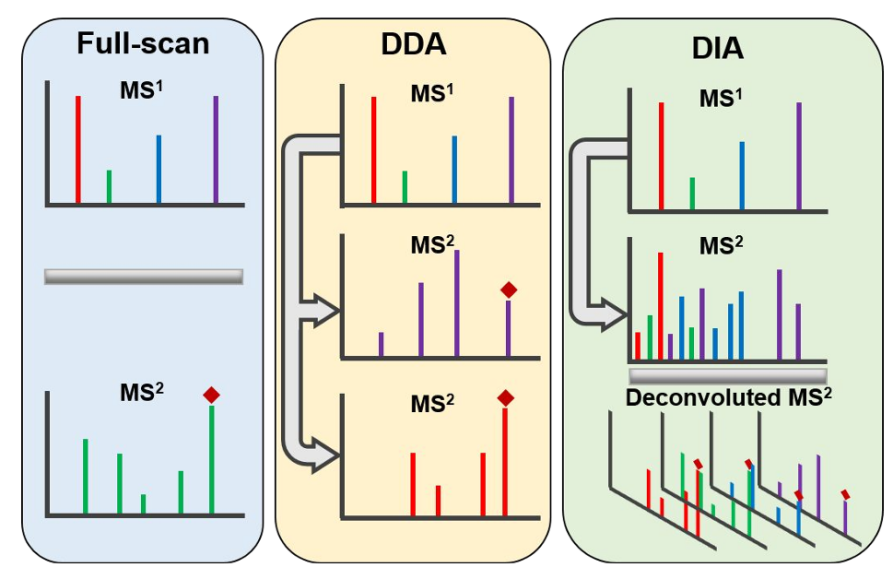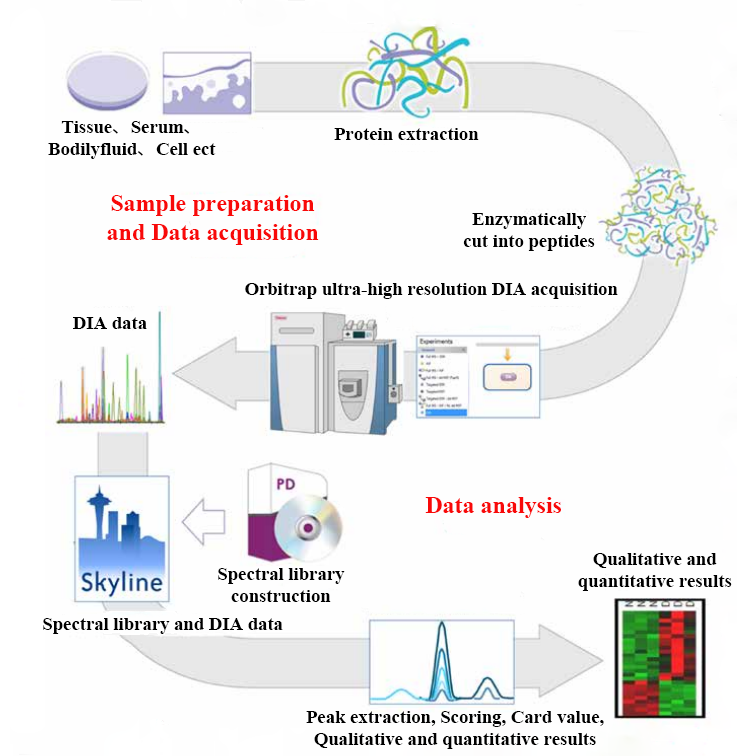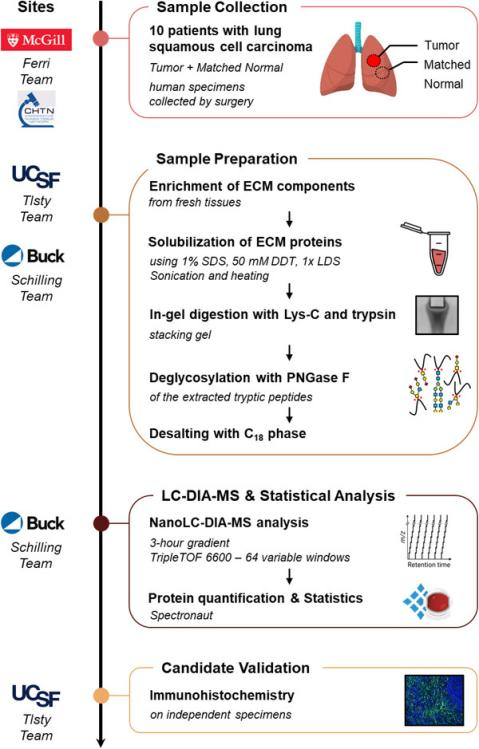DIA Proteomics Analysis Service
Data-independent acquisition (DIA) divides the scanning range of mass spectrometry into several windows according to the mass-to-charge ratio, breaks and detects all the parent ions in each window, and collects the secondary spectrum information of all peptide ions for protein qualitative and quantitative analysis.Compared to Data-Dependent Acquisition (DDA), DIA can obtain information on all peptides without discrimination, preventing the loss of low-abundance protein information. Additionally, DIA has fixed cycle times, evenly distributed scan points, and high quantification accuracy. The peptide selection process is not random, and the data can be retroactively analyzed, offering superior reproducibility. DIA proteomics analysis service provides a comprehensive and exhaustive analysis of all proteins in a sample, broadening the throughput and depth of proteomics research. It has promising applications in fields such as disease diagnosis, biomarker discovery, and drug development.

Guo J. et al. Anal Chem. 2020.
Figure 1. Comparison of Three Acquisition Modes: Full Scan, DDA, and DIA.
Analysis Workflow
1. Sample Preparation
The sample needs to undergo protein extraction, enzymatic hydrolysis, desalting, peptide quantification and other steps, and then sample injection analysis, or mixed standard peptides are added and then loaded and analyzed through the DIA proteomics analysis service platform.
2. Data Acquisition
The unified DIA template can be used directly to collect Orbitrap mass spectrometry quickly and with high throughput to obtain high-quality DIA data.
3. Data Analysis
DIA data is processed using software such as Skyline, which matches and scores the spectra against a spectral library to provide reliable identification results. The highest responding and most selective fragment ions are automatically selected, and ion pair chromatographic peak extraction is performed to obtain precise quantitative information.

www.thermofisher.cn
Figure 2. Flow Chart of Data Independent Acquisition (DIA) Based on Orbitrap.
Services at MtoZ Biolabs
MtoZ Biolabs offers a variety of advanced mass spectrometry platforms, integrating high-resolution, stability, sensitivity, and rapid scanning features. Our services include the following:
1. Routine DIA Proteomics Analysis Service
Based on mass spectrometers such as the Orbitrap Fusion Lumos Tribrid, Orbitrap Exploris 480, and Orbitrap Astral, MtoZ Biolabs provides DIA proteomics analysis service that features excellent sensitivity, dynamic range, mass accuracy, and resolution. DIA proteomics can theoretically capture all ion fragment information from samples, improving data utility.
2. DIA-PRM Proteomics Analysis Service
PRM(parallel reaction monitoring) can selectively detect specific peptides or target peptides (such as peptides modified after translation), so as to achieve targeted relative or absolute quantification of target protein/modified peptides. The combination of DIA and PRM for protein omics research can realize the detection of large or complex samples and the accurate quantification of target proteins, and improve the detection rate of low abundance target protein.
3. 4D-DIA Proteomics Analysis Service
4D proteomics adds ion mobility as a fourth dimension to traditional proteomics, which includes peptide retention time, ion intensity, and ion mass-to-charge ratio. This enhances the performance of mass spectrometers and establishes higher standards for proteomic analysis. 4D-DIA allows for cycling through all ion information, leading to fewer missing values and more comprehensive detection, making it ideal for large-scale research.
Service Advantages
1. Advanced Analysis Platform
MtoZ Biolabs has established advanced DIA proteomics analysis service platform to ensure reliable, fast, and high-precision analysis.
2. Transparent Pricing
Our pricing is transparent with no hidden or additional fees.
3. High Data Quality
Our deep data coverage and strict quality control ensure high-quality results. Our AI-driven bioinformatics platform integrates all DIA proteomics data, providing comprehensive reports.
4. Customized Research Solutions
MtoZ Biolabs offers customized services tailored to your unique research challenges and experimental needs.
Applications
1. Biomarker Discovery
DIA proteomics analysis service can be used to more comprehensively analyze the proteins in biological samples, helping to discover disease-specific biomarkers for early diagnosis, prognosis evaluation, and monitoring of treatment.
2. Clinical Drug Research
DIA proteomics can identify drug targets and assess drug efficacy. By comparing protein expression changes in cells or organisms under different drug treatments, researchers can better understand drug mechanisms, optimize drug design, improve efficacy, and reduce side effects.
3. Neuroscience
DIA proteomics has made significant strides in research on neurodegenerative diseases, such as Alzheimer’s. By comparing protein expression differences between patients and healthy individuals, researchers can identify protein changes associated with disease, providing new insights into the mechanisms of disease progression.
Case Study
1. DIA and quantification of human lung extracellular matrix in chronic inflammation-associated cancer
Chronic inflammation-associated cancers (CIACs) account for a quarter of global cancer cases and result in over 2 million deaths annually. Early events in CIACs involve significant extracellular matrix (ECM) remodeling, greatly affecting its composition and functional properties.The DIA proteomics analysis service system combines ECM enrichment and rigorous data analysis methods to quantitatively analyze proteins in lung squamous cell carcinoma (LSCC) and its adjacent tissues.Among 1,802 identified proteins, 56% were annotated as "extracellular," and 529 proteins showed significant changes in cancer tissues compared to adjacent tissues. Data analysis revealed a significant increase in SERPINH1/heat shock protein 47 levels, which was experimentally verified via immunohistochemistry. The application of DIA proteomics to interpret ECM proteome remodeling in LSCC provides deeper insights into how ECM changes promote tumorigenesis. Overall, DIA proteomics is a powerful strategy for comprehensive analysis and quantification of all detectable ions in biological samples, offering higher quantification accuracy and reproducibility while providing a means for forward-looking research.

Bons J. et al. Proteomic.2022.
Figure 3. Study Design and Proteomic Process for ECM Analysis of Lung Squamous Cell Carcinoma.
MtoZ Biolabs, an integrated Chromatography and Mass Spectrometry (MS) Services Provider, provides advanced proteomics, metabolomics, and biopharmaceutical analysis services to researchers in biochemistry, biotechnology, and biopharmaceutical fields. Our ultimate aim is to provide more rapid, high-throughput, and cost-effective analysis, with exceptional data quality and minimal sample consumption. Free project evaluation, welcome to learn more details!
MtoZ Biolabs, an integrated chromatography and mass spectrometry (MS) services provider.
Related Services
How to order?







